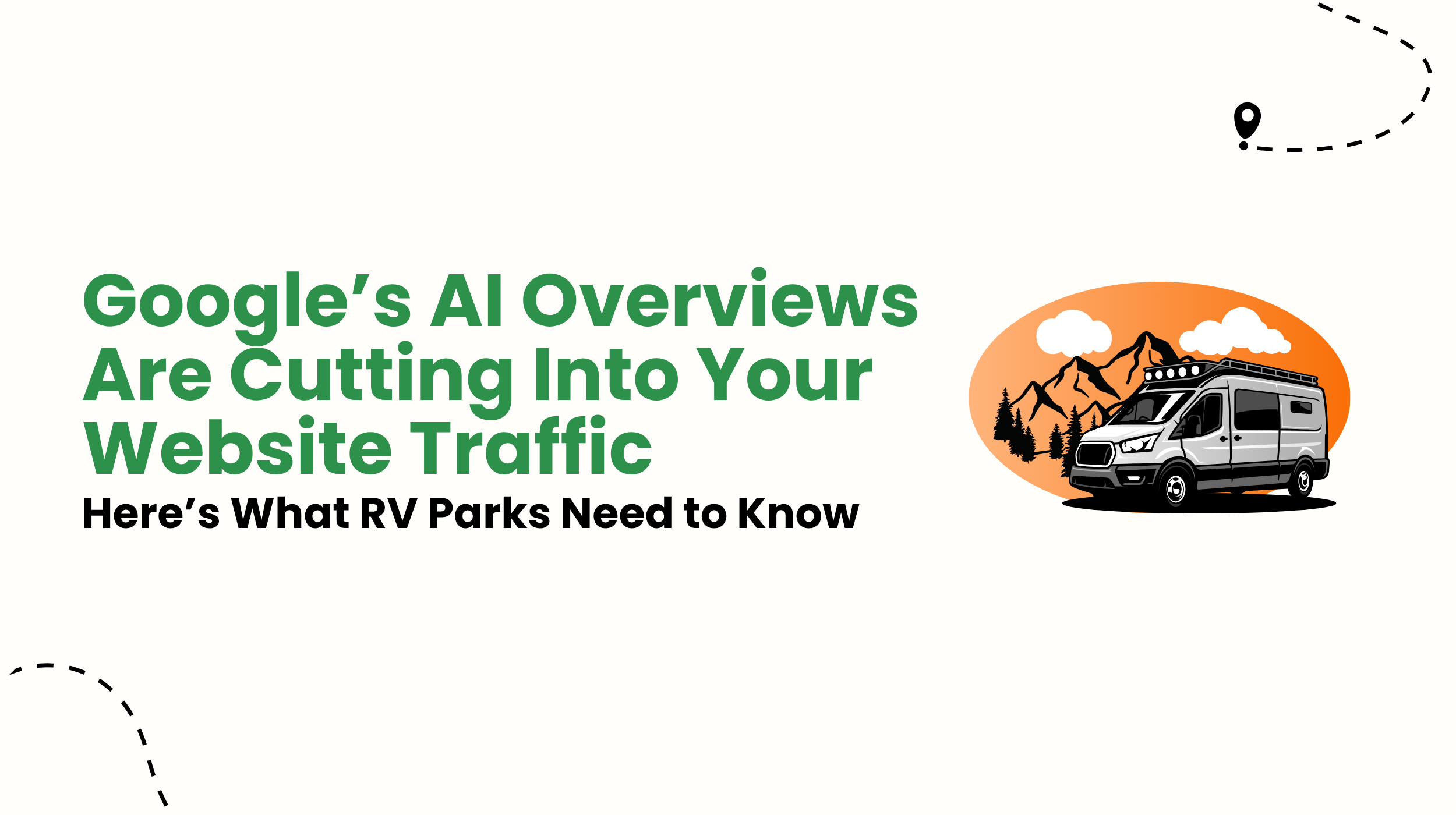TL;DR:
Recent data shows a dramatic drop in click-through rates when AI Overviews appear in Google search results. That means fewer people are clicking through to RV park and campground websites, even if you rank on the first page. In 2025, if your marketing strategy hasn’t adapted to how Google is changing, you’re likely missing bookings and losing visibility without even realizing it.
AI Overviews Are Changing the Rules of Search
In July 2025, Pew Research released a report confirming a major shift in how people use Google. When Google shows an AI Overview, a box at the top of the search results that summarizes the answer to a user’s question, the number of clicks to websites drops by nearly 50%.
In plain English: Google is answering people’s questions before they even scroll, and they’re not clicking through to campground websites to learn more.
According to the report:
- Only 8% of users click a result when an AI Overview is shown, compared to 15% when it’s not.
- 1% of users click on the sources that are actually cited inside the AI box.
- More than 1 in 4 people abandon the search altogether after reading the AI summary.
If you’ve noticed a recent dip in your website traffic or booking inquiries, despite still ranking well in Google, it could be because the clicks are disappearing before they reach you.
Why Traditional SEO Isn’t Cutting It Anymore
For years, the playbook for getting found online was straightforward: build a website, add some keywords about your location and amenities, maybe write a few blog posts about nearby hikes or travel tips, and you’d gradually climb the search rankings.
But Google’s new AI Overviews are changing how search works, especially for travel, location-based, and informational searches.
Instead of showing a list of clickable links, Google now uses AI to generate a summary of the answer based on sources it trusts. These often include sites like:
- Wikipedia
- Government tourism pages
- Major travel blogs
- Forums like Reddit or TripAdvisor
If your park’s website doesn’t meet certain technical and content standards, Google likely isn’t using it to build those answers. That means your site may still “rank,” but it’s buried under a box that satisfies the user’s question before they ever see your link.
What Campgrounds and RV Parks Should Do Now
You don’t need to overhaul everything, but you do need to shift your approach if you want to stay visible in search. Here are four key steps:
1. Reevaluate Your Content Strategy
Focus on content that offers more than what Google’s AI can summarize. That includes:
- In-depth comparisons of site types (pull-through vs back-in, hookups, etc.)
- Guest stories and user-generated content (photos, reviews, testimonials)
- Owner tips and local recommendations that don’t exist elsewhere
AI can summarize a government camping page, but it can’t recreate your unique voice and local expertise.
2. Target Prompts, Not Just Keywords
Ask yourself: “What would a potential guest actually type into Google?”
Build content around those questions using:
- FAQ sections
- Long-tail phrases like “RV parks near Glacier with showers”
- Related questions and variations people might ask
You can use tools like AlsoAsked or even Google’s People Also Ask box to find real-world questions.
3. Optimize for AI Overviews and SERP Features
Make your site easier for Google’s AI to understand and trust. That means:
- Adding FAQ schema and clear Q&A content on key pages
- Creating connections to trusted sources (mentioning nearby attractions, linking to official tourism sites)
- Organizing your content into internal topic clusters so it signals expertise
4. Refresh and Expand Existing Pages
Look at your top landing pages and ask:
- Does this content feel current and complete?
- Would it be useful enough for Google to pull into an AI summary?
- Is it built to answer traveler questions, not just describe my park?
If the answer’s no, it’s time for a content refresh.
Don’t Let Google Answer for You
AI Overviews aren’t a fad, they’re now a regular part of how people search. And if your RV park’s website isn’t built to show up in these summaries or even stay visible beneath them, you’re going to lose out on traffic, leads, and bookings, even if your rankings look good on paper.
The good news? Most campground websites are still behind the curve. If you’re willing to adapt, you can get ahead and be the trusted, local voice that Google leans on when building its answers.
- Reevaluate your SEO strategy to reflect how people actually search in 2025.
- Shift your content to focus on prompts, traveler intent, and semantic relevance.
- Get visible again, not just in search results, but in the answers themselves.
Want help updating your marketing strategy to match how travelers search today? We work with parks and resorts across the country to increase direct bookings by making sure their websites show up in the right places. AI Overviews included.
